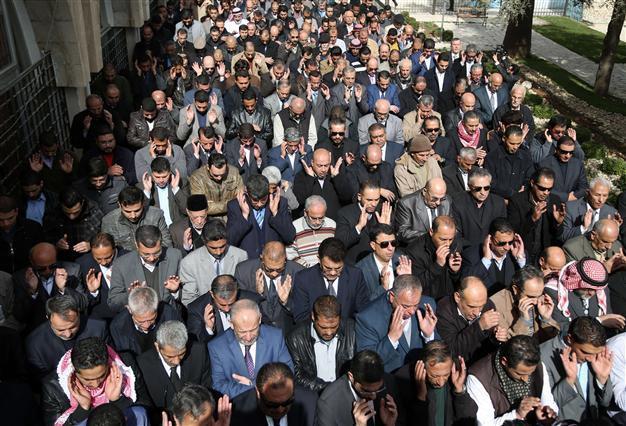Jordan weighs options against ISIL after pilot murder
AMMAN - Agence France-Presse

Jordanian Muslim worshippers perform a prayer on February 4, 2015 in the capital Amman, for Jordanian pilot Maaz al-Kassasbeh, who was burnt alive by ISIL militants after they captured him when his jet crashed in northern Syria in December. AFP Photo
Jordan weighed its next move Feb. 5 against the Islamic State of Iraq and the Levant (ISIL) after vowing a harsh response to the burning alive of a fighter pilot,
whose family called for the jihadists to be "destroyed".
Jordan
is one of several Arab states to have joined US-led air strikes against
ISIL, which has seized swathes of Syria and Iraq and imposed its brutal
version of Islamic law.
The gruesome murder of airman Maaz
al-Kassasbeh, who was captured by ISIL when his F-16 fighter plane went
down in Syria in December, has boosted public support in Jordan for
stepped up military action against the jihadists.
"Jordan
will wage all-out war to protect our principles and values," the Al-Rai
government newspaper wrote in an editorial. "We are on the lookout for
this band of criminals."
King Abdullah II cut short a
visit to the United States and flew back to Amman on Wednesday after the
harrowing video emerged of Kassasbeh's killing.
"The
blood of martyr Maaz al-Kassasbeh will not be in vain and the response
of Jordan and its army after what happened to our dear son will be
severe," he said afterwards.
Before dawn on Wednesday,
Jordan executed two Iraqis on death row -- female would-be suicide
bomber Sajida al-Rishawi and Al-Qaeda operative Ziad al-Karboli -- in
response to the killing of the 26-year-old pilot.
So far Amman has not said what its promised harsh response will entail.
Kassasbeh's murder has even prompted speculation the kingdom may prepare ground troops to confront ISIL.
Jordan's
last such military engagement in the region was in 1973, when it sent
soldiers to Syria as part of an Arab coalition against Israel in the Yom
Kippur war.
The airman's killing sparked
outrage in Jordan and demonstrations in Amman and the city of Karak, the
home of Kassasbeh's influential tribe.
The slain pilot's father Safi al-Kassasbeh branded ISIL "infidels and terrorists who know no humanity or human rights".
"The international community must destroy the Islamic State group," he said.
ISıL
had offered to spare Kassasbeh's life and free Japanese journalist
Kenji Goto -- who was later beheaded -- in exchange for Rishawi's
release.
Rishawi, 44, was sentenced to death for her participation in triple hotel bombings in Amman in 2005 that killed 60 people.
She was closely linked to IS's predecessor organisation in Iraq and seen as an important symbol for the jihadists.
Following
the airman's capture, another member of the US-led coalition, the
United Arab Emirates, withdrew from air strike missions due to fears for
the safety of its pilots, a US official said.
"I can confirm that UAE suspended air strikes shortly after the Jordanian pilot's plane went down," the official told AFP.
"But
let me be clear that UAE continues to be an important and valuable
partner that is contributing to the coalition," said the official, who
spoke on condition of anonymity.
US President Barack
Obama, who had hosted Abdullah in a hastily organised meeting before his
return to Jordan, decried the "cowardice and depravity" of ISIL.
Turkish President Recep Tayyip Erdogan said the brutality of ISIL was "beyond comprehension".
"It
has nothing to do with our religion."
Kassasbeh was captured on
December 24 when his jet crashed over northern Syria on a mission that
was part of the coalition air campaign against the jihadists.
Jordanian
state television suggested he was killed on January 3, before ISIL
offered to spare his life and free Goto in return for Rishawi's release.
ISIL
had previously beheaded two US journalists, an American aid worker and
two British aid workers in similar videos. It has also killed a second
Japanese hostage.
